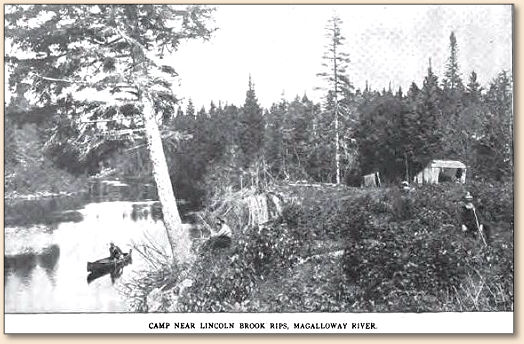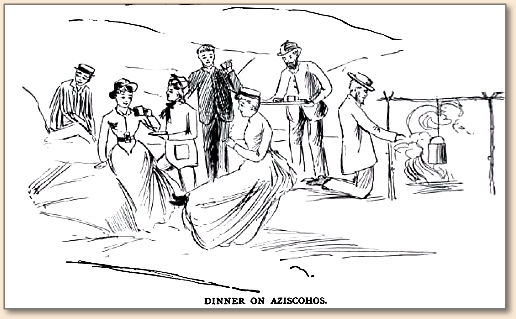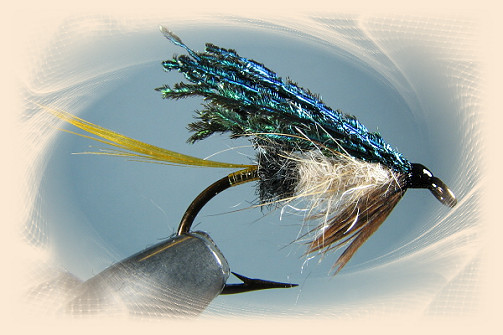This interesting little fly was named for the Magalloway River
in the Rangeley Region of Maine. This river starts in the upper
Northwestern part of the state, and flows for 40 miles south, into
and out of Lake Parmachene, down through Aziscohos Lake,
and ultimately joins the Androscoggin River at the outlet of Ubagog
Lake. The fly features a peacock sword wing, similar to the one found on
the Alexandria. These wings have long been out of favor now, and I
wonder why. I would imagine that under the right circumstances these
appendages waving in the water would make for a very effective and
attractive fly.

Charles A. J. Farrar's book Through the Wilds,
written in 1892, details a trip he and his cohorts took
up the Magalloway which started in New Hampshire,
and eventually reached Lake Parmachenee (as they called it).
You can see a lean-to they built along the way in the background
of the picture above. The first part of the trip included their wives,
and was taken by steamer. Along the way the sights included the
Diamond Peaks, Pulpit Rock, and culminated with a climb up Mount
Aziscohos. Farrar's description of the view is as follows:
From the top of Mount Aziscohos you gaze upon a forest
wilderness, bounded only by the blue sky in which it is lost. A grand
upheaval of mountain peaks and ranges, many of which are wooded
to their summits. Circle upon circle of billowy ridges, their tops green
or gray, extending from beneath you to the utmost limit of your sight.
This is the first impression of the view as it bursts upon your bewildered
gaze. Afterward you have time to notice that between nearly all of these
mountains are ponds, lakes, or rivers. Indeed, I doubt if there is a mountain
in New England from whose summit you can distinctly see and count so many
other mountains and so many pieces of water as from this one. I have
climbed more than the average number of mountains allotted to most men,
and I have never found its equal in this respect. I could not name half of the
mountains and pieces of water seen from the summit of old Aziscohos, and
I doubt if it has ever been visited by any one who could.
Some of the principal ranges and peaks seen and known are the Half-Moon,
Dustan, Moose, Blue, Sawyer, Deer, Kennebago, Saddleback, the Bigelow
Peaks, Swan, Bald Pate [now known as Bald Mountain], Speckled Mountain,
Mount Katahdin, the high peaks of the White Mountains, Mount Chocorua and
Boundary Mountains. The entire chain of the Androscoggin, Magalloway,
Kennebago, and Rangeley Rivers are but a few of the bodies of water.
Wow, quite a view, encompassing landmarks in two states! I got a kick out
of a sketch of the group having lunch on top of the mountain. This was, after
all, the Victorian period, and there was never reason to be underdressed.

It was shortly after this that the men bid adieu to the women, and began
the more rigorous canoe journey up to Parmachenee. More adventures
ensue, and lots of hunting and fishing is done on the way. It's closer to a
safari than a fishing trip, and these trips were long treks into what was at
the time, unknown wilderness for the most part. We can only now
dream what this must have been like. Dream, and tie flies from the
period, and dream some more.
Magalloway
Tip: Gold tinsel
Tail: Golden pheasant crest
Butt: Black chenille
Body: Light brown dubbing, picked out
Hackle: Furnace hen
Wing: Peacock sword
Credits: Camp Life in the Wilderness by
Capt. Charles A. J. Farrar; Through the Wilds by
Capt. Charles A. J. Farrar; Flies by J. Edson Leonard;
Trout by Ray Bergman; ~ EA
About Eric:
 Eric lives in Delaware, Ohio and fishes for brown trout in
the Mad River, a beautiful spring creek. More of his flies
are on display here:
Traditionalflies.com -- Classic salmon and
trout flies of Europe and the Americas.
Eric lives in Delaware, Ohio and fishes for brown trout in
the Mad River, a beautiful spring creek. More of his flies
are on display here:
Traditionalflies.com -- Classic salmon and
trout flies of Europe and the Americas.
|




 Eric lives in Delaware, Ohio and fishes for brown trout in
the Mad River, a beautiful spring creek. More of his flies
are on display here:
Traditionalflies.com -- Classic salmon and
trout flies of Europe and the Americas.
Eric lives in Delaware, Ohio and fishes for brown trout in
the Mad River, a beautiful spring creek. More of his flies
are on display here:
Traditionalflies.com -- Classic salmon and
trout flies of Europe and the Americas.